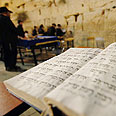
Illustration
Photo: Eli Elias
In our parasha we read: “Remember the long way that the Lord your God has made you travel in the wilderness these past forty years, that He might test you by hardships to learn what was in your hearts: whether you would keep His commandments or not” (Deuteronomy 8:2). This is immediately followed by an example of something for Israel to remember: Manna. In one verse, God sums up the lessons He wishes to teach the people: “He subjected you to the hardship of hunger and then gave you manna to eat, which neither you nor your fathers had ever known, in order to teach you that man does not live on bread alone, but that man may live on anything that the Lord decrees” (Deut. 8:3).
Let us examine the verse by subject. The first thing we encounter is suffering. God asks Israel to remember the hardships of the desert: hunger, thirst, heat and uncertainty. But He also asks that they remember that it was God who came to their aid and gave them manna. God employs this state of hardship to teach us to value those commonplace things that we take for granted until we lose them.
The second thing is the miracle of the manna. The manna reminds the Israelites that God is always testing them. He wonders: Will they believe in Me despite their hunger? When they receive the manna in the morning, do they harbor doubts as to whether God will provide manna on the following day? The people complained and asked for meat and for the good, varied foods that they ate in Egypt. How much longer would they be willing to eat the same thing? God gave them a strange, unfamiliar substance that arrived in a special way in order to prove their faith in Him and to test whether they would continue to obey His commandments and walk in his paths.
The verse continues with the famous phrase: “man does not live on bread alone.” Simply read, it appears to mean that besides eating “bread,” which is a common food that requires preparation, the people must believe and recognize that it is possible to eat and survive with other foods, perhaps simpler but of greater value, like manna. This conclusion is also an appropriate response to the people’s prior demand for “the fish that we used to eat free in Egypt, the cucumbers, the melons, the leeks, the onions, and the garlic” (Numbers 11:5).
On the other hand, and in a deeper sense, the phrase also teaches us that the search for material sustenance, even if it is a basic necessity of life, need not be the central purpose of our existence. We must also “nourish” our spiritual side, which distinguishes us from all other creations.
In the end we are told “that man may live on anything that the Lord decrees.” Even if God created us with the ability to choose and act, we must not forget His presence, His involvement, and His influence upon the world, upon nature and upon everything, as we are told: “Take care lest you forget the Lord your God ...” (Deut. 8:11), “lest your heart grow haughty and you forget the Lord your God ...” (Deut 8:14), “who fed you in the wilderness with manna, which your fathers had never known, in order to test you by hardships only to benefit you in the end — and you say to yourselves, ‘My own power and the might of my own hand have won this wealth for me.’ Remember that it is the Lord your God who gives you the power to get wealth, in fulfillment of the covenant that He made on oath with your fathers, as is still the case” (Deut. 8: 16-18).
According to what we have learned, what is the purpose of the test God presents to Israel by the miracle of the manna?
“Bear in mind that the Lord your God disciplines you just as a man disciplines his son” (Deut 8:5).
God seeks to teach the Israelites then, and all of us in every generation, the way that parents teach their children: sometimes the hard way, but always with love. He gives us His commandments as a guide to lead us through life, both materially and spiritually, in order to teach us to value even the most common things in life that we take for granted, but that are actually the essence of life. He reminds us that the “miracles” that we experience every day of our lives are the result of the partnership between human beings who wisely use their ability to choose and act, and a watchful God who desires and enables their existence through His blessings.
Rabbi Sandra Kochmann – HaKehilla HaMasortit Mishpachtit of Beit HaKerem















